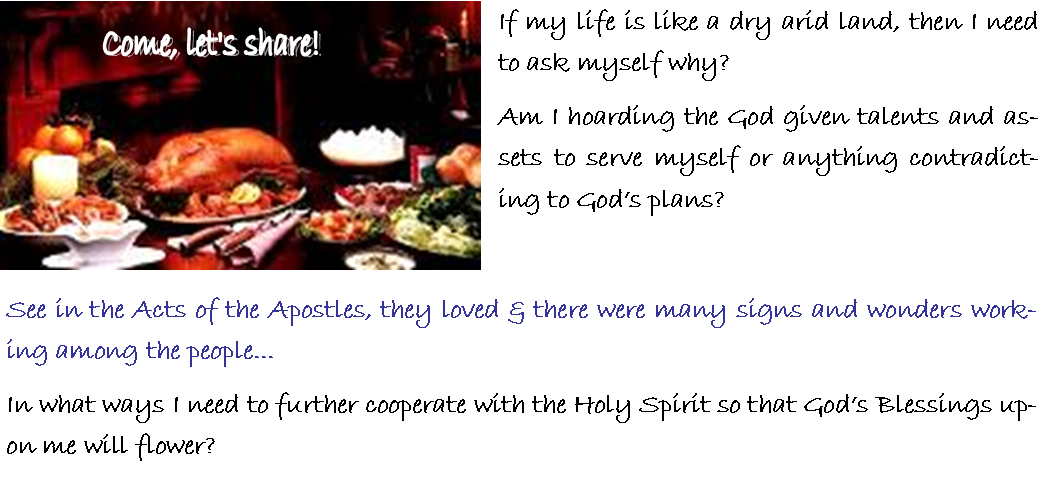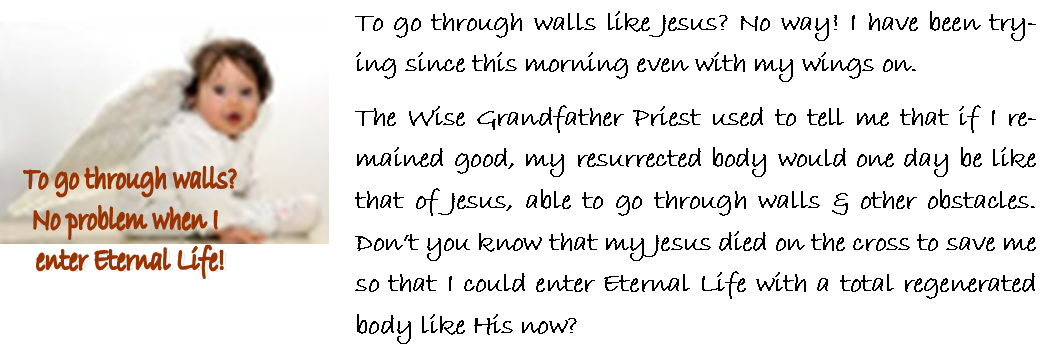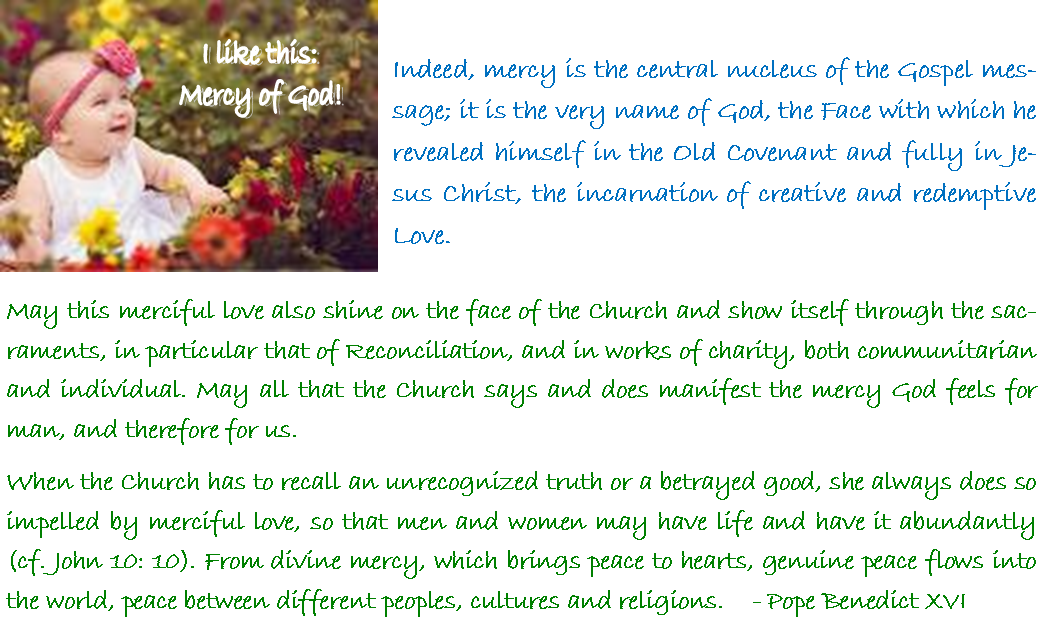|
160 |

|
Second Sunday of Easter, First Reading: Extracted from the Acts of the Apostles 2:42-47 The whole community remained faithful to the teaching of the apostles, to the brotherhood, to the breaking of bread and to the prayers. The many miracles and signs worked through the apostles made a deep impression on everyone. The faithful all lived together and owned everything in common; they sold their goods and possessions and shared out the proceeds among themselves according to what each one needed. They went as a body to the Temple every day but met in their houses for the breaking of bread; they shared their food gladly and generously; they praised God and were looked up to by everyone. Day by day the Lord added to their community those destined to be saved. |

|
Second Sunday of Easter, Responsorial Psalm 118:2-4, 13-15, 22-24 Give thanks to the Lord for he is good, for his love has no end.
Let the sons of Israel say: ‘His love has no end.’ Let the sons of Aaron say: ‘His love has no end.’ Let those who fear the Lord say: ‘His love has no end.’
I was thrust down, thrust down and falling, but the Lord was my helper. The Lord is my strength and my song; he was my saviour. There are shouts of joy and victory in the tents of the just.
The stone which the builders rejected has become the corner stone. This is the work of the Lord, a marvel in our eyes. This day was made by the Lord; we rejoice and are glad. |

|
Second Sunday of Easter, Second Reading: Extracted from the 1st letter of Peter: 1 Peter 1:3-9 Blessed be God the Father of our Lord Jesus Christ, who in his great mercy has given us a new birth as his sons, by raising Jesus Christ from the dead, so that we have a sure hope and the promise of an inheritance that can never be spoilt or soiled and never fade away, because it is being kept for you in the heavens. Through your faith, God’s power will guard you until the salvation which has been prepared is revealed at the end of time. This is a cause of great joy for you, even though you may for a short time have to bear being plagued by all sorts of trials; so that, when Jesus Christ is revealed, your faith will have been tested and proved like gold – only it is more precious than gold, which is corruptible even though it bears testing by fire – and then you will have praise and glory and honour. You did not see him, yet you love him; and still without seeing him, you are already filled with a joy so glorious that it cannot be described, because you believe; and you are sure of the end to which your faith looks forward, that is, the salvation of your souls.
Gospel Acclamation John 20:29 Alleluia, alleluia! Jesus said: ‘You believe because you can see me. Happy are those who have not seen and yet believe.’ Alleluia! |
|
2nd Sunday of Easter, Gospel Reading: Extracted from the holy Gospel according to John 20:19-31 In the evening of that same day, the first day of the week (Easter Sunday), the doors were closed in the room where the disciples were, for fear of the Jews. Jesus came and stood among them. He said to them, ‘Peace be with you’, and showed them his hands and his side. The disciples were filled with joy when they saw the Lord, and he said to them again, ‘Peace be with you. ‘As the Father sent me, so am I sending you.’ After saying this he breathed on them and said: ‘Receive the Holy Spirit. For those whose sins you forgive, they are forgiven; for those whose sins you retain, they are retained.’ Thomas, called the Twin, who was one of the Twelve, was not with them when Jesus came. When the disciples said, ‘We have seen the Lord’, he answered, ‘Unless I see the holes that the nails made in his hands and can put my finger into the holes they made, and unless I can put my hand into his side, I refuse to believe.’ Eight days later the disciples were in the house again and Thomas was with them. The doors were closed, but Jesus came in and stood among them. ‘Peace be with you’ he said. Then he spoke to Thomas, ‘Put your finger here; look, here are my hands. Give me your hand; put it into my side. Doubt no longer but believe.’ Thomas replied, ‘My Lord and my God!’ Jesus said to him: ‘You believe because you can see me. Happy are those who have not seen and yet believe.’ There were many other signs that Jesus worked and the disciples saw, but they are not recorded in this book. These are recorded so that you may believe that Jesus is the Christ, the Son of God, and that believing this you may have life through his name. |


|
Sharing:
It was the Second Sunday of Easter on 27 April 2014.
The Readings that were read in the Eucharistic Celebrations all over the world on the same day are shown above:
First Reading: Acts 2:42-47, Responsorial Psalm: Psalm 118:2-4, 13-15, 22-24, Second Reading: 1 Peter 1:3-9 & Gospel Reading: John 20:19-31.
We have extracted the Homilies of Saint John Paul II, Pope Benedict XVI & Pope Francis I based on the aforesaid Readings to share with you, so that you could similarly be encouraged: |

|
BENEDICT XVI REGINA CÆLI Courtyard of the Papal Residence, Castel Gandolfo
Dear Brothers and Sisters,
During the Jubilee of the Year 2000 the beloved Servant of God John Paul II established that throughout the Church the Sunday after Easter should be called Domenica in Albis and Divine Mercy Sunday. This occurred contemporaneously with the canonization of Faustina Kowalska, a humble Polish Sister who was born in 1905 and died in 1938, a zealous messenger of the Merciful Jesus. Indeed, mercy is the central nucleus of the Gospel message; it is the very name of God, the Face with which he revealed himself in the Old Covenant and fully in Jesus Christ, the incarnation of creative and redemptive Love. May this merciful love also shine on the face of the Church and show itself through the sacraments, in particular that of Reconciliation, and in works of charity, both communitarian and individual. May all that the Church says and does manifest the mercy God feels for man, and therefore for us. When the Church has to recall an unrecognized truth or a betrayed good, she always does so impelled by merciful love, so that men and women may have life and have it abundantly (cf. John 10: 10). From divine mercy, which brings peace to hearts, genuine peace flows into the world, peace between different peoples, cultures and religions.
Like Sr Faustina, John Paul II in his turn made himself an apostle of Divine Mercy. In the evening of the unforgettable Saturday, 2 April 2005, when he closed his eyes on this world, it was precisely the eve of the Second Sunday of Easter and many people noted the rare coincidence that combined the Marian dimension - the first Saturday of the month - and the dimension of Divine Mercy. This was in fact the core of John Paul II's long and multi-faceted Pontificate. The whole of his mission at the service of the truth about God and man and of peace in the world is summed up in this declaration, as he himself said in Krakow-Łagiewniki in 2002 when he inaugurated the large Shrine of Divine Mercy: "Apart from the mercy of God there is no other source of hope for mankind". John Paul II's message, like St Faustina's, thus leads back to the Face of Christ, a supreme revelation of God's mercy. Constant contemplation of this Face is the legacy he bequeathed to us which we joyfully welcome and make our own.
In the coming days, on the occasion of the First World Apostolic Congress on Divine Mercy, there will be a special reflection on Divine Mercy. It will be held in Rome and will begin with Holy Mass at which, please God, I shall preside on Wednesday morning, 2 April, the third anniversary of the pious death of the Servant of God John Paul II. Let us place the Congress under the heavenly protection of Mary Most Holy Mater Misericordiae. Let us entrust to her the great cause of peace in the world, so that God's mercy may achieve what is impossible for human forces on their own and instil in hearts the courage for dialogue and reconciliation.
----------------------------------------------------------
After the Regina Caeli:
I first address a cordial greeting to the many pilgrims who are gathered at this moment in St Peter's Square, especially those who took part in Holy Mass celebrated in the Church of Santo Spirito in Sassia by Cardinal Tarcisio Bertone on the occasion of the Feast of Divine Mercy. Dear brothers and sisters, may the intercession of St Faustina and of the Servant of God John Paul II help you to be authentic witnesses of merciful love.
Today, as an example to emulate, I would like to point out Mother Celestina Donati, Foundress of the Congregation of the Daughters of the Poor of St Joseph Calasanz, known as the Calasanctian Sisters, who will be beatified in Florence today.
I greet all the English-speaking pilgrims and visitors here today. This Sunday's Gospel reminds us that through faith we recognize the presence of the Risen Lord in the Church, and that we receive from him the gift of the Holy Spirit. During this Easter Season may we strengthen our desire to bear witness to the Good News of Jesus Christ calling us to a life of peace and joy. Upon each of you present and your families, I invoke God's Blessings of happiness and wisdom.
Today, I return to Rome. If God so wills we shall see each other in July. I wish you all a good week. Goodbye and have a good Sunday.
4 May 2014 |